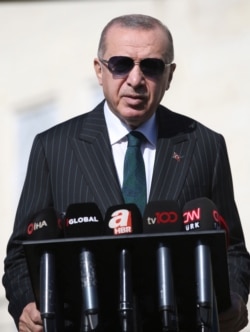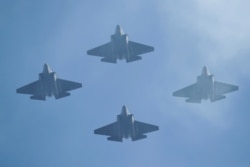Tensions between the United States and Turkey appear to be growing, following the latest war of words between the two allies over Ankara’s purchase of Russia’s S-400 air defense system.
The latest spat ignited Friday, after Turkish President Recep Tayyip Erdogan confirmed earlier reports that Turkey has started testing the Russian-made system, brushing aside U.S. concerns.
"(The tests) have been and are being conducted,” Erdogan told reporters. “The United States' stance absolutely does not concern us.”
“If we are not going to test these capabilities at our disposal, then what are we going to do?" he added.
The U.S. Defense Department responded hours later Friday, with a harshly worded statement, stopping short of accusing Turkey of betraying the alliance.
"The U.S. Department of Defense condemns in the strongest possible terms Turkey’s October 16 test," Chief Pentagon Spokesman, Jonathan Rath Hoffman said, warning the testing “risks serious consequences for our security relationship.”
“We have been clear and unwavering in our position,” Hoffman added. “An operational S-400 system is not consistent with Turkey’s commitments as a U.S. and NATO ally."
Reports that Turkey has started testing the Russian-made air defense system first emerged last week, sparking a series of condemnations from the Pentagon, the U.S. State Department and some U.S. lawmakers.
The Pentagon, at the time, warned Turkey that the system “should not be activated.”
Turkey signed a deal to buy the S-400 air defense system from Russia back in 2017, and the first deliveries began in July of last year.
Since then, the U.S. has suspended Turkey from participation in its F-35 stealth fighter jet program and, at times, has considered potential sanctions against Ankara even though it is a NATO ally.
U.S. officials have warned Turkey’s use of the advanced Russian radar technology could compromise NATO’s military systems and could potentially be used to target NATO jets in Turkey, including the F-35.
Turkey has previously dismissed such concerns, and Erdogan indicated Friday there may not be much the U.S. can do to get hm to change course.
"It seems that the gentlemen (in the U.S.) are especially bothered that this is a weapon belonging to Russia,” Erdogan told reporters, before adding, “We are determined, we are continuing on our path as always."
Information from Reuters was used in this report.






